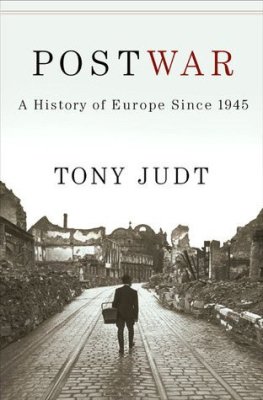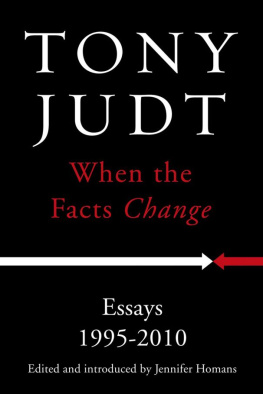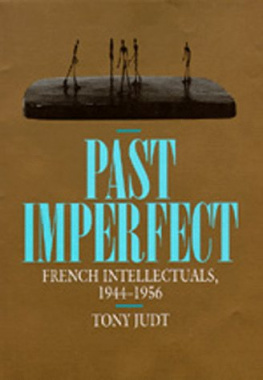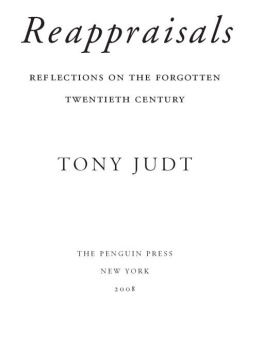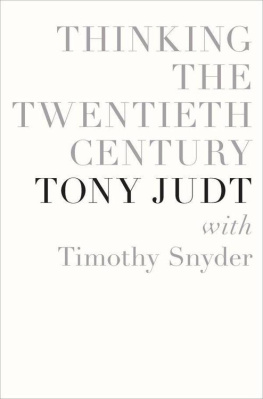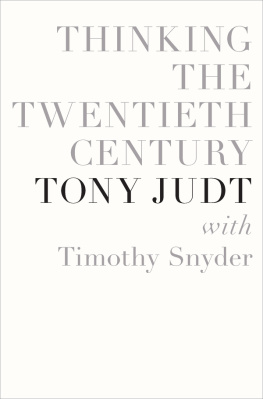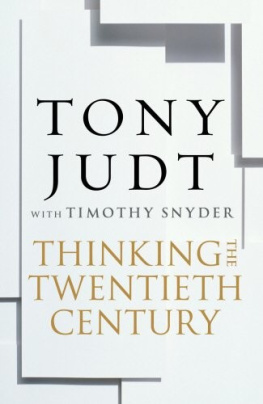Tony Judt
POSTWAR
A History of Europe Since 1945
Is not the pastness of the past the more profound, the more legendary, the more immediately it falls before the present?
THOMAS MANN,
The Magic MountainPraise for Tony Judts Postwar
If anyone can bring off the impossible task that Tony Judt has set himself in Postwar, it is he. He brings to Postwar an astonishing range of knowledge and an intense political, intellectual and emotional engagement; these are nicely offset by the intellectual distance that the Channel and the Atlantic have helped to provide and by a wry sense of the innumerable ways in which events play tricks on all of us. The result is a book that has the pace of a thriller and the scope of an encyclopedia; it is a very considerable achievement. Brilliant.
The New York Review of BooksPostwar is a remarkable book. The excellence of Postwar was no doubt hard to achieve but it is easy to describe. The writing is vivid; the coverageof little countries as well as of great onesis virtually superhuman; and, above all, the book is smart. Every page contains unexpected data, or a fresh observation, or a familiar observation freshly turned.
Louis Menand,
The New YorkerMassive, kaleidoscopic and thoroughly readable [Judts] book becomes the definitive account of Europes rise from the ashes and its take-off into an uncertain future.
Time (One of the Must-Read Books of 2005)
Tony Judt is one of our most dazzling public intellectuals, as thoughtful as he is knowledgeable. Postwar is like having an extended personal seminar on Europes journey back both from the ashes of World War Two and the cruel, totalitarian hold of Soviet communism.
David Halberstam
Nobody is more qualified than Judt to combine serious descriptive history with incisive, original political analysis, to cover both western and eastern Europe, and to pass stinging yet informed judgments on the behavior and evasions, the deeds and the failings, of his subjects. This monumental work is a tour-de-force.
Foreign AffairsProfessor Judt knows more about contemporary Europe than almost any American (or any European, for that matter). In Postwar, he brings that formidable knowledge to bear on the inspiring story of Europes transformation from lethal division and devastating war to a peaceful, prosperous pan-continental union. His history of how the Iron Curtain crumbled is definitive.
T. R. Reid, author of
The United States of EuropeAn epically important subjectEurope as both the epicenter of political and ideological catastrophes in the last century and the principal laboratory for an experiment in whatever chance humanity has of a peace in the century just begunhas, to the benefit of us all, found the author it deserves. Tony Judt, long one of the wisest heads and clearest voices around, has produced a magisterial history and a solid foundation for clear thinking about the future. Postwar is meticulous in its scholarship, compelling in the story it tells, and passionate in its judgments. A true masterpiece.
Strobe Talbott, president, Brookings Institution
Truly superb. It is hard to imagine how a betterand more readablehistory of the emergence of todays Europe from the ashes of 1945 could ever be written.
Ian Kershaw
Magisterial He has written a magnificent conventional history of modern Europe, but its quality and its power come from the way he insists that his narrative is also a history of ideas and of the peculiar vulnerability of the European mind to ideologies and to the patterns of thought and political loyalty they impose.
National AffairsAs soon as you realize how good it is, this book will frighten you. This is a work which, on almost every page, evokes to readers over the age of forty what they once felt, hoped for, took part in, or fled from. Judt has written, in great detail and at great length, the biography of a middle-aged continent trying, after a disgraceful past, to settle down and go straight.
Neal Acherson,
London Review of BooksRich and immensely detailed.
The New York Times Book Review
Tony Judt has produced not only the heaviest history of modern Europe ever written, but probably the best. [He] moves fluently and deftly from politics and economics to films and television, whisking the reader through West German coalition-building, past the French New Wave, and on toward the Eurovision Song Contest. [A] magnificently rich and readable book.
The Sunday Times (London)
Masterly and exhilarating Judt has made the culture wars between communism and anticommunism a special subject and he deals with this brilliantly once more. Judt has a fine eye for telling detail. This is a splendid book to which no review can do proper justice. So many subjects are adroitly dealt with.
Geoffrey Wheatcroft,
The SpectatorThis is the best history we have of Europe in the postwar period and not likely to be surpassed for many years. Here [Judt] combines deep knowledge with a sharply honed style and an eye for the expressive detail. Insightful analysis and excellent writing overall, this is history writing at its very best.
Publishers Weekly (starred review)
[A] lively and thoughtful historical overview of todays Europe from the end of World War II through the economic, social, cultural and political changes and continuities of the last sixty years. Judt sees the bigger picture of the trends, events, and people that have made contemporary Europe. This book is certain to be a major addition to postwar European studies.
Library JournalElegant and provocative a genuinely magisterial account.
The Times Literary Supplement[Judts] prose is lean, his metaphors vivid He impressively covers a broad array of cultural themes.
The New York SunCompelling and fluidly written.
The OregonianPostwar, Judts learned, massive, and often quite wonderful summary of European public life since World War II A triumph of narrative.
The NationFor those who want to understand the course of contemporary Europe, the primary material is almost too copious and familiar; it takes a gifted historian to shape it into something fresh and coherent without sacrificing the details. [Postwar] does just that it offers a brilliant and compelling synthesis of the past sixty years.
Time EuropePostwar is a stupendous contribution to understanding developments in postwar Europe, especially in the countries behind the Iron Curtain. [Judts] brilliant survey of the culture wars is matched by his dramatic narrative of the political turmoil.
15 MinutesUnusually comprehensive and highly readable scholarship.
International Herald TribuneTony Judt was born in London in 1948. He was educated at Kings College, Cambridge, and the cole Normale Suprieure, Paris, and has taught at Cambridge, Oxford, Berkeley, and New York University, where he is currently the Erich Maria Remarque Professor of European Studies and Director of the Remarque Institute, which he founded in 1995. The author or editor of eleven books, he is a frequent contributor to The New York Review of Books, The New York Times, and many other journals in Europe and the United States. Professor Judt is a Fellow of the American Academy of Arts and Sciences, a Fellow of the Royal Historical Society, and a Permanent Fellow of the Institut fr die Wissenschaften vom Menschen (Vienna).
PENGUIN BOOKSPublished by the Penguin Group
Penguin Group (USA) Inc., 375 Hudson Street, New York, New York 10014, U.S.A.

